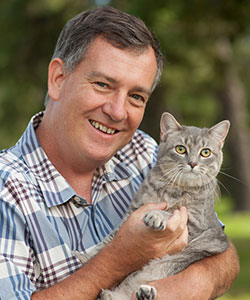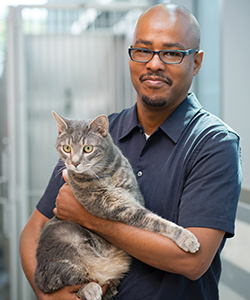2016 - 2017 Funded Research Projects
The Cornell Feline Health Center Research Grant Program provides vital financial support to Cornell researchers investigating issues that affect feline health. Projects currently funded by the Cornell Feline Health Center range from studies of feline infectious peritonitis (FIP) to finding the genetic causes of certain inherited diseases.
Scientific research has made feline medicine what it is today, and it’s making a healthier, happier tomorrow possible for cats around the world. If you believe in the positive power of our work to make a difference, please consider making a donation to the Cornell Feline Health Center today.
Helping design new treatments for feline herpesvirus infections

Feline herpesvirus type 1 (FHV-1) is the single biggest cause of viral eye disease in cats. In spite of the high prevalence of this disease, little is known about the immune response to ocular FHV-1 infection in cats. Although certain antiretroviral drugs are currently used to treat these infections, there is a similar lack of understanding about how these drugs work or how effective they are. Using cells grown in the lab, Dr. Gerlinde Van de Walle will study the immune response during infection with FHV-1 to better understand how the body responds to the pathogen. She’ll also study the ways in which a common antiviral drug, Raltegravir, interacts with the immune system.
The results of the work will provide a solid understanding of how both FHV-1 and antiviral agents can affect inflammation and immunity, knowledge that can have an impact on management and treatment of ocular herpes.
Grant title: Towards rationally-based treatments for FHV-induced ocular disease in cats
Investigators: Gerlinde Van de Walle, DVM, Ph.D. with collaborators/consultants: Eric Ledbetter, DVM and Charles Danko, Ph.D.
Making anesthesia less dangerous for cats in surgery

The drug dexmedetomidine (DEX) is commonly used as a sedative, painkiller, and pre-anesthetic in cats undergoing surgery. Although DEX is very useful, it can have potentially serious cardiac side-effects, including slowed heart rate, decreased heart output, and other problems. The drug that’s currently used to counteract these effects, atipamezole (ATI), has its own undesirable effects and isn’t yet approved for use in cats. Dr. Martin-Flores plans to study the efficacy of ATI and a new drug, MK-467, to counteract cardiovascular depression caused by DEX. With the results of this study, he expects to be able to make firm recommendations about the safety of using ATI and/or MK-467 in anesthetized cats.
Grant title: Pharmacologic antagonism of the cardiovascular impairment produced by the commonly used sedative/analgesic dexmedetomidine, in anesthetized cats
Investigators: Manuel Martin-Flores, M.V.
 How does the virus that causes FIP become lethal?
How does the virus that causes FIP become lethal?
Feline coronavirus (FCoV) usually causes relatively benign gastroenteritis in cats, but in between 5 and 10% of infected cats, it may mutate to a form that causes feline infectious peritonitis (FIP), a deadly disease that most often strikes very young cats and cats over the age of 10. Dr. Gary Whittaker has found evidence that enzymes involved in the cat’s own immune response may be key to converting the virus into its lethal form. He plans to identify and characterize the enzymes that act on the FCoV virus to further understand their role in the development of FIP, work that will help inform the development of much-needed diagnostic tests for FIP. Whittaker’s study will also provide a foundation for future therapies to treat this devastating disease.
Grant title: Role of matrix metalloproteases in FIPV-infected macrophages and the development of FIP in cats
Investigator: Gary R. Whittaker, Ph.D.
Tracing the causes of feline genetic diseases
Heritable diseases are common in cats, but the number of genetic tests available for these conditions is small. Dr. Rory Todhunter and his collaborators plan to help boost our ability to understand and diagnose these conditions by studying feline genetic sequences to identify which genes are involved in a number of common inherited diseases of cats. They will solicit blood samples from cats with these diseases that are admitted to the Cornell University Hospital for Animals and compare the genetic profiles of these cats with the profiles of healthy older cats to identify genes involved in such conditions as hyperthyroidism, gingivitis/stomatitis, diabetes mellitus, hypertrophic cardiomyopathy, factor XII deficiency, alimentary tract lymphoma/lymphosarcoma, obesity, hip dysplasia, and generalized osteoarthritis. They will also sequence the entire genomes of seven cats in order to contribute to the development of a new genetic screening tool, called a mapping array, specifically designed to screen cats for genetic disease.
Grant title: Expansion of genetic mapping and genomic resources for the domestic cat
Investigators: Rory Todhunter, BVSc, Ph.D. with co-investigator Adam Boyko, Ph.D.
Why do some vaccines fail?
 When viruses or bacteria invade the body, the immune system kicks in to get rid of them, but this response is better understood in the human body than in cats. To shed more light on the feline immune system, Dr. John Parker and his colleagues will deploy techniques used to study the human immune response to find out how cats respond to the feline calicivirus vaccine. By identifying and isolating the antibodies and B-cells involved, they hope to better understand what happens when feline vaccines fail to elicit an immune response that protects the cat from disease. These feline antibodies may also eventually be useful tools for diagnosing and treating other diseases, including other infectious diseases and cancer.
When viruses or bacteria invade the body, the immune system kicks in to get rid of them, but this response is better understood in the human body than in cats. To shed more light on the feline immune system, Dr. John Parker and his colleagues will deploy techniques used to study the human immune response to find out how cats respond to the feline calicivirus vaccine. By identifying and isolating the antibodies and B-cells involved, they hope to better understand what happens when feline vaccines fail to elicit an immune response that protects the cat from disease. These feline antibodies may also eventually be useful tools for diagnosing and treating other diseases, including other infectious diseases and cancer.
Grant title: Development of Feline monoclonal antibodies for use as therapeutic and diagnostic tools
Investigators: John S.L. Parker, BVMS, Ph.D. with co-investigators Douglas Antczak, VMD, Ph.D., Julia Felippe Med. Vet., MS, Ph.D., and Tracy Stokol BVSC, Ph.D.
Turning the immune system against feline cancer

 Cancer is a leading cause of death in cats, particularly in older animals. Although surgery and chemotherapy are effective in treating many forms of feline cancer, they may leave behind traces of cancer that can cause recurrence and can cause unwanted side effects. Modulation of the immune system has been used to treat human cancers, and Drs. Avery August and Bettina Wagner are seeking ways to do the same for cats by developing immunotherapeutics for treating feline cancer. They plan to develop an antibody-based technique that will unleash a cat’s own immune system to effectively attack cancer cells. By characterizing and producing the antibodies involved in modulation of the feline immune system, they will shed light on the feline immune system, its response to cancer, and how it can be used to fight a variety of feline cancers.
Cancer is a leading cause of death in cats, particularly in older animals. Although surgery and chemotherapy are effective in treating many forms of feline cancer, they may leave behind traces of cancer that can cause recurrence and can cause unwanted side effects. Modulation of the immune system has been used to treat human cancers, and Drs. Avery August and Bettina Wagner are seeking ways to do the same for cats by developing immunotherapeutics for treating feline cancer. They plan to develop an antibody-based technique that will unleash a cat’s own immune system to effectively attack cancer cells. By characterizing and producing the antibodies involved in modulation of the feline immune system, they will shed light on the feline immune system, its response to cancer, and how it can be used to fight a variety of feline cancers.
Grant title: Monoclonal antibodies against feline PD-1 (CD279) as potential immunotherapeutic agents for feline cancers
Investigators: Avery August, Ph.D. and Bettina Wagner, DVM, Ph.D.



